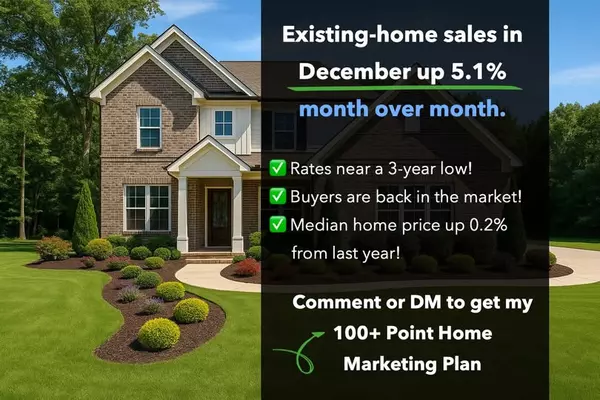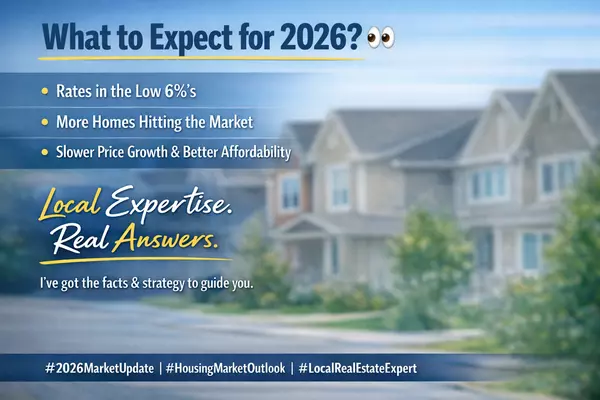Top 5 Reasons To Hire a Real Estate Agent When You Sell

Some HighlightsThe right agent doesn’t just list your house – they help you sell smarter, faster, and with fewer surprises.With an agent’s help, you’ll know what’s happening in your local market and how to price your house right. You’ll feel confident filling out complex legal documents and at the n
Read MoreMulti-Generational Homebuying Hit a Record High – Here’s Why

Multi-generational living is on the rise. According to the National Association of Realtors (NAR), 17% of homebuyers purchase a home to share with parents, adult children, or extended family. That’s the highest share ever recorded by NAR (see graph below):And what’s behind the increase? Affordabilit
Read MoreWhat Every Homeowner Needs To Know In Today’s Shifting Market

Here’s something you need to know. The housing market is getting back to a healthier, more normal place. And even though it may not sound like it, this shift is actually a good thing.It’s what you should expect. It’s just that our expectations have been skewed by the intense seller’s market over the
Read MoreThink It’s Better To Wait for a Recession Before You Move? Think Again.

Fear of a recession is back in the headlines. And if you’re thinking about buying or selling sometime soon, that may leave you wondering if you should reconsider the timing of your move.A recent survey by John Burns Research and Consulting (JBREC) and Keeping Current Matters (KCM) shows 68% of peopl
Read MoreWhy Your Home's Asking Price Matters More Today

Some HighlightsA growing number of homeowners are overestimating today’s market. And that’s why the number of sellers dropping their price is back at normal levels.A lot of the time this is happening because they’re not paying attention to current conditions. The best way to avoid that mistake? Le
Read MoreWhy Homeownership Is Going To Be Worth It

Life can feel a bit unpredictable these days. What’s happening with inflation? The economy? The housing market? But in the middle of all that uncertainty, there’s one thing a lot of people still crave – a place to call their own.Because when everything else feels up in the air, home can be the thing
Read More3 Reasons To Buy a Home This Summer

Are you thinking about buying a home, but not sure if now’s the right time? A lot of people are waiting and wondering what the market’s going to do next. But here’s something only the savviest buyers realize:This summer might actually be the best time to buy in years. Here are three big reasons why.
Read MoreWhy More Sellers Are Choosing To Move, Even with Today’s Rates

It’s hard to let go of a 3% mortgage rate. There’s no question about it. It’s the main reason why so many homeowners have delayed their move in recent years. But here’s something to consider.While your low rate might be ideal, it doesn’t make up being too cramped, having a staircase your knees can’t
Read MoreWhat You Really Need To Know About Down Payments

Some HighlightsThere’s a misconception going around that you have to put 20% of the purchase price down when you buy a home. But the truth is, many people don’t put down that much unless they’re trying to make their offer more competitive.And if you want to give your savings a boost, look into down
Read MoreWhy Most Sellers Hire Real Estate Agents Today

Selling your house without an agent as a “For Sale by Owner” (FSBO) may be something you’ve considered. But you should know that, in today’s shifting market, more homeowners are deciding that’s just not worth the risk.According to the latest data from the National Association of Realtors (NAR), the
Read MoreYou May Have Enough Equity To Downsize and Buy Your Next House in Cash

Some HighlightsHave you been holding off on downsizing? If so, you should know your equity could make your move possible.Homeowners today have so much equity that a record number are buying their next house in all cash. And that has some big benefits like making their offer more appealing, potential
Read MoreYour House Didn’t Sell. Here’s What To Do Now.

When your house doesn’t sell, it doesn’t just feel frustrating – it feels personal. You put time, money, and emotional energy into this move. You told your friends and family it was happening. And now that your listing has expired without a buyer? You’re left feeling stuck, and maybe even a little e
Read MoreIs Inventory Getting Back To Normal?

After years of it feeling almost impossible to find a home you want to buy, things are changing for the better. Nationally, inventory is growing, and that gives you more options for your move. But here’s what you need to know. That level of growth is going to vary based on where you live. And that’s
Read MoreThe Five-Year Rule for Home Price Perspective

Headlines are saying home prices are starting to dip in some markets. And if you’re beginning to second guess your plans based on what you’re hearing in the media, here’s what you need to know.It's true that a few metros are seeing slight price drops. But don't let that overshadow this simple truth.
Read MoreBuying Your First Home? FHA Loans Can Help

If you’re a first-time homebuyer, you might feel like the odds are stacked against you in today’s market. But there are resources and programs out there that can help – if you know where to look. And one thing that can make homeownership easier to achieve? An FHA home loan.They’re designed to help y
Read MoreThe Big Difference Between a Homeowner’s and a Renter’s Net Worth

Some HighlightsHomeownership is one of the best ways to build wealth in our country and it’s easy to see why.As you pay down your mortgage and as home values rise over time, you gain equity – and that helps grow your net worth. That’s why a homeowner’s net worth is nearly 40X greater than a renters.
Read MoreThe Rooms That Matter Most When You Sell

Now that buyers have more options for their move, you need to be a bit more intentional about making sure your house looks its best when you sell. And proper staging can be a great way to do just that.What Is Home Staging?It’s not about making your house look super trendy or like it belongs in a mag
Read MoreUnderstanding Today’s Mortgage Rates: Is 3% Coming Back?

A lot of buyers are pressing pause on their plans these days, holding out hope that mortgage rates will come down – maybe even back to the historic-low 3% from a few years ago. But here’s the thing: those rates were never meant to last. They were a short-term response to a very specific moment in ti
Read MoreWhy Buying Real Estate Is Still the Best Long-Term Investment

Lately, it feels like every headline about the housing market comes with a side of doubt. Are prices going up or down? Are we headed for a crash? Will rates ever come down? And all the media noise may leave you wondering: does it really make sense to buy a home right now?But here’s one thing that do
Read MoreNewly Built Homes May Be Less Expensive Than You Think

Do you think a brand-new home means a bigger price tag? Think again.Right now, something unique is happening in the housing market. According to the Census and the National Association of Realtors (NAR), the median price of newly built homes is actually lower than the median price for existing homes
Read More
Categories
Recent Posts










